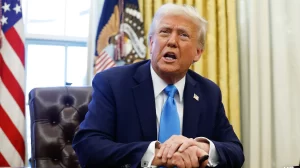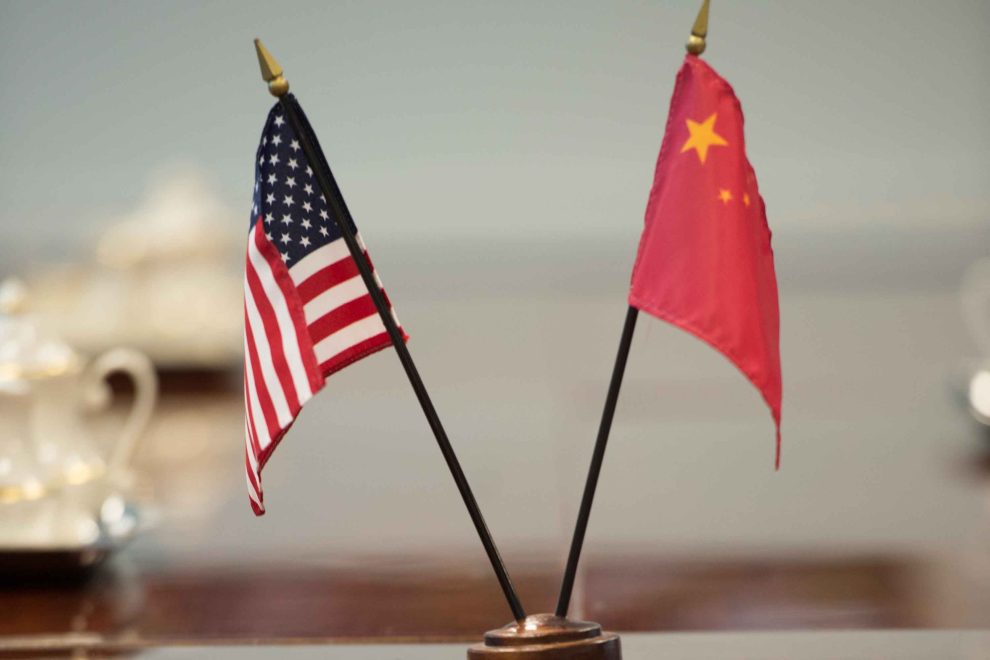The momentum towards war between the US and China is building. The rhetoric of both President Joe Biden’s Democrats and the Republicans is ever more ferocious. US military spending spirals upwards, and an increasing array of trade restrictions and other sanctions is being imposed on Chinese companies and Chinese products. And it is not just the US.
Japan is engaging in a rapid expansion of its military capacity, with a massive 20 percent increase in its latest arms budget to US$55 billion. South Korea, which already spends proportionately more than Japan on the military, is increasing its arms expenditure by 6.8 percent annually over the next five years.
Virtually every European country is also arming itself to the teeth. Australia is not lagging behind, with the decision by the Albanese government to splurge what probably will amount to more than $400 billion on the AUKUS nuclear-powered submarines.
For its part, China is hardly holding back. It has been determinedly modernising and enhancing its fighting capacity over recent decades.
But is a major war between the great powers really going to happen? Surely the horrendous scale of death and destruction inevitable in a major war, let alone a full-blown nuclear war, is not in the interests of either the US or Chinese ruling classes? Surely common sense will prevail and the powers that be will pull back from the brink and reach some diplomatic solution with concessions on all sides?
That understandably is the sentiment—the wish and hope—of tens of millions of decent people rightly terrified by the prospect of another world war. How could any sane person want to see an all-out war on a scale that would likely make World War One and World War Two seem like schoolyard brawls?
The trouble is that capitalism is driven by competition between companies, and the states that back them up, for profits, market shares, outlets for investment, control over trade routes and access to raw materials. This dog-eat-dog competition repeatedly lays the basis for barbaric wars to advance or defend the power and wealth of capitalist nation-states against their rivals.
The most likely scenario is not one of a full-blown war between the US and China in the next four or five years. Neither side currently feels it is yet ready for that.
The more likely but still incredibly dangerous scenario is a prolonged period of escalating tensions, shoring up of alliances and military build-ups on both sides that make a showdown seemingly inevitable at some point—a showdown that could easily be unleashed by some miscalculation or entirely unpredicted event.
That is what happened in the case of World War One. In January 1914, nobody in their wildest dreams would have imagined that a mere six months later one of the deadliest wars in human history, with a death toll of between 15 and 22 million, would be sparked by the assassination of Austrian Archduke Franz Ferdinand by a little-known Serbian nationalist in the Bosnian capital of Sarajevo.
But events rapidly spiralled out of control. The rulers of the Austro-Hungarian Empire responded by delivering a harsh ultimatum to Serbia, though they did not intend it to provoke a world war.
The German Empire, Austria’s ally, initially believed the struggle could be confined to yet another localised conflict in the Balkans and that Britain would stay out of it. But the tsarist Russian state, which proclaimed itself the protector of the south Slavs, ordered a general mobilisation against Austria.
Germany then declared war on Russia. When France failed to respond to a German ultimatum to remain neutral in the conflict, Germany also declared war on France and invaded Belgium.
The German invasion of Belgium in turn provoked Britain, which hypocritically declared itself the protector of poor little Belgium, to declare war on Germany. That immediately dragged in Australia, Canada, India and all the other countries of the British Empire. On and on it went, with Turkey backing Germany and Japan backing Britain.
Italy stayed out for a while, but was eventually enticed to join the allied side with promises of a chunk of Austrian territory. The US imperialists, ever the opportunists, waited until the other major powers were near exhaustion before joining in, which gave the US a decisive role in the final imperialist carve-up of Europe.
The world war grew out of a tectonic shift in the balance of imperial power, in some ways similar to what is happening today. Britain, the first highly industrialised capitalist state, had established a vast colonial empire backed by a navy that had long “ruled the waves”. But from the 1890s, it was in a slow relative decline, a bit like the US today, challenged by the new rising powers, the US and Germany.
Britain and the other old imperialist powers—France, the Netherlands, Belgium and Portugal—had carved up the world between them, meaning that Germany, the European power with the fastest industrial growth, was left with virtually no empire and little space in which to gain new markets and greater profits. As German imperialism pushed out—attempting to establish its own colonies, client states and trading partners—it inevitably butted up against the old colonial powers, in a similar way as China does with the US today.
To establish their “place in the world”, the rulers of the German Empire, urged on by the major German capitalists, realised that they had to vastly expand their military. They could not rely only on diplomacy or “peaceful” trade and investment.
Consequently, Germany turned its industrial might to building a fleet of battleships to challenge Britain’s domination of the seas, and later a host of submarines to attack British merchant shipping. Britain retaliated by building “dreadnought” battleships.
France increased military service in its conscript army from two years to three, to match the German military. Russia set up its own state-run arms factories and designed its railway system with potential wars against Germany, the Austro-Hungarian Empire and the Ottoman Empire in mind. The road to war was being paved.
A series of flare-ups, diplomatic incidents, shifting alliances and localised wars further set the scene: the 1899-1902 Boer War; the Morocco crises of 1905 and 1911, in which Germany challenged French control; the Italo-Turkish war of 1911-12, which sparked two further major wars in the Balkans, during which the major powers egged on their local favourites.
In each case, a broader war was prevented and diplomatic deals eventually were patched up, though vast numbers of lives were lost in the Balkan wars. But the cynical diplomatic deals and trade-offs could hold off a decisive clash for only so long. The rival lines were being drawn increasingly sharply. All the built-up pressure, which could well have exploded earlier, finally burst out into total war with the assassination of the archduke in Sarajevo.
The capitalist world order has undoubtedly changed substantially since 1914. The balance of imperialist forces is very different: new powers have emerged, the old colonial empires are long gone, and incomparably more destructive weapons systems are now deployed.
However, the underlying competitive logic of capitalism remains entrenched. Capitalism is still a system based on the exploitation of the labour of workers and in which the pursuit of profit triumphs over all human needs. The relentless competitive logic of capitalism leads to poverty and degradation, repeated economic crises, the destruction of the environment and ongoing clashes over markets, investment opportunities and access to raw materials. The consequence is repeated outbreaks of war.
The innumerable destructive wars fought since the end of World War Two have not so far led to an all-in conflagration. And it is often argued that in the nuclear age, MAD (mutually assured destruction) makes another world war between nuclear-armed powers extremely unlikely.
MAD did help underpin the so-called détente between the two superpowers, Russia and the US, with their relatively evenly balanced destructive capacity. But nuclear war was only very narrowly avoided at the time of the October 1962 Cuban missile crisis. The slightest miscalculation could have led to Armageddon.
With the relative decline of the US and the rise of China, the balance of imperialist forces has changed decisively over the last two decades, and that makes for a much more unstable and uncertain situation. The US-Soviet “détente” that began in 1969 has long gone.
And even if MAD makes the great powers extremely hesitant to unleash nuclear weapons on each other, it did not prevent the outbreak of the war in Ukraine—the greatest military conflict in the heartlands of Europe since the end of World War Two.
The Ukraine war has demonstrated how massively destructive so-called conventional weaponry has become. And while it has so far not triggered a broader European war or a nuclear war, a future major conventional war could well do so.
China is not ready for war with the US, and as a rising power it can seemingly make sense for it to play the long game. But the Chinese capitalist class can miscalculate or get overconfident or feel they are being squeezed too hard by the US (as Japan’s rulers felt in the lead-up to Pearl Harbor). Or Chinese rulers can be impelled to take risky measures like invading Taiwan because of internal political tensions.
As for the US ruling class, they could decide at some point that it is better to strike before China becomes too strong, or they could push China too hard with trade sanctions or they too could go to war for internal political reasons.
Wars aren’t necessarily well thought out and planned in advance. But because competition is central to capitalism, there is always the potential for war to break out, and military build-ups can have their own logic.
War is not inevitable, but we can’t rely on diplomacy or the good sense of our rulers. And we can’t sit back and wait to see what happens. We need to start laying the basis for a mass anti-war movement that challenges the powers that be.
War is not in the interests of working-class people in Australia, China or the US or Japan. As in all capitalist wars, workers are the ones who will do the dying and make the sacrifices while the wealthy capitalist speculators reap the profits.
In the lead-up to the war in Iraq, hundreds of thousands of protesters took to the streets in all of Australia’s major cities to oppose it. Recent opinion polls show that most people rightly don’t want a war with China.
So there is an anti-war sentiment to build on. To help organise that sentiment into a powerful movement over the coming years, a key task is building a determined socialist alternative to the pro-war mainstream parties.
Source : Redflag































